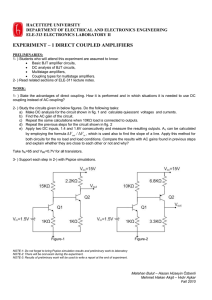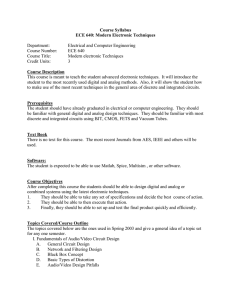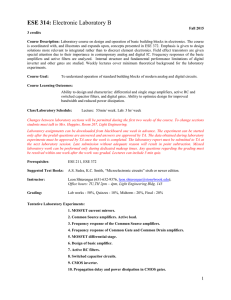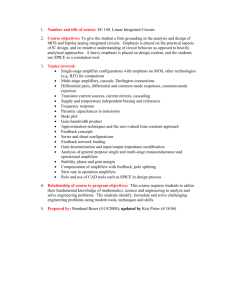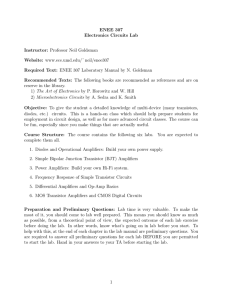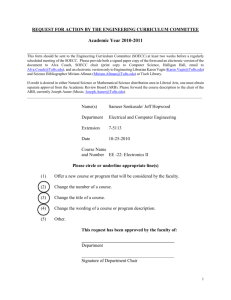EE 3322 Electronic Circuits II Catalog Description: Introduction to
advertisement
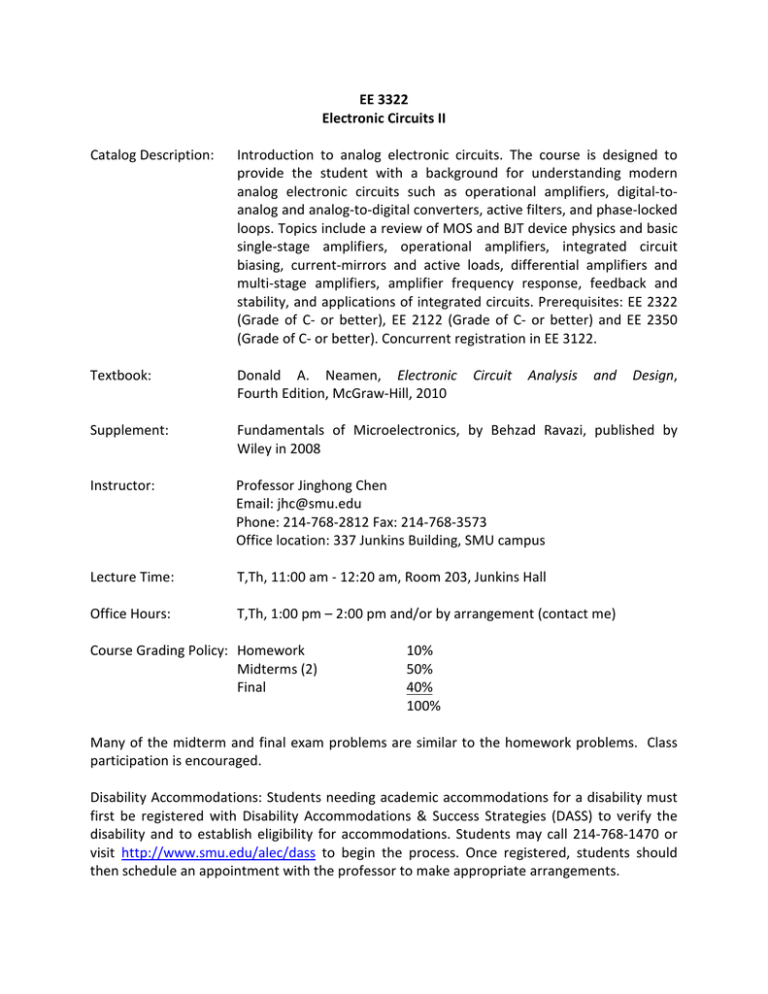
EE 3322 Electronic Circuits II Catalog Description: Introduction to analog electronic circuits. The course is designed to provide the student with a background for understanding modern analog electronic circuits such as operational amplifiers, digital-toanalog and analog-to-digital converters, active filters, and phase-locked loops. Topics include a review of MOS and BJT device physics and basic single-stage amplifiers, operational amplifiers, integrated circuit biasing, current-mirrors and active loads, differential amplifiers and multi-stage amplifiers, amplifier frequency response, feedback and stability, and applications of integrated circuits. Prerequisites: EE 2322 (Grade of C- or better), EE 2122 (Grade of C- or better) and EE 2350 (Grade of C- or better). Concurrent registration in EE 3122. Textbook: Donald A. Neamen, Electronic Fourth Edition, McGraw-Hill, 2010 Supplement: Fundamentals of Microelectronics, by Behzad Ravazi, published by Wiley in 2008 Instructor: Professor Jinghong Chen Email: jhc@smu.edu Phone: 214-768-2812 Fax: 214-768-3573 Office location: 337 Junkins Building, SMU campus Lecture Time: T,Th, 11:00 am - 12:20 am, Room 203, Junkins Hall Office Hours: T,Th, 1:00 pm – 2:00 pm and/or by arrangement (contact me) Course Grading Policy: Homework Midterms (2) Final Circuit Analysis and Design, 10% 50% 40% 100% Many of the midterm and final exam problems are similar to the homework problems. Class participation is encouraged. Disability Accommodations: Students needing academic accommodations for a disability must first be registered with Disability Accommodations & Success Strategies (DASS) to verify the disability and to establish eligibility for accommodations. Students may call 214-768-1470 or visit http://www.smu.edu/alec/dass to begin the process. Once registered, students should then schedule an appointment with the professor to make appropriate arrangements. Religious Observance: Religiously observant students wishing to be absent on holidays that require missing class should notify their professors in writing at the beginning of the semester, and should discuss with them, in advance, acceptable ways of making up any work missed because of the absence. (See University Policy No. 1.9.) Excused Absences for University Extracurricular Activities: Students participating in an officially sanctioned, scheduled University extracurricular activity should be given the opportunity to make up class assignments or other graded assignments missed as a result of their participation. It is the responsibility of the student to make arrangements with the instructor prior to any missed scheduled examination or other missed assignment for making up the work. (University Undergraduate Catalogue) Final Exams: Final course examinations shall be given in all courses where they are appropriate, must be administered as specified in the official examination schedule, and shall not be administered during the last week of classes or during the Reading Period. Student Learning Outcomes Outcome: C (Ability to design a system, component, or process to meet desired needs within realistic constraints such as economic, environmental, social, political, ethical, health and safety, manufacturability, and sustainability) Outcome: K (An ability to use the techniques, skills, and modern engineering tools necessary for engineering practice EE3322 - Electronic Circuits II I. BJT and MOSFET Device Physics, and Basic Amplifiers – Review II. Operational Amplifiers and Op Amp Circuits III. Amplifier Frequency Response IV. Integrated Circuit Biasing, Current Mirrors and Active Loads V. Differential Amplifiers and Multistage Amplifiers VI. Feedback and Stability VII. Applications of Integrated Circuits (Comparators, Filters, Oscillators, and A-to-D and D-to-A Converters)
